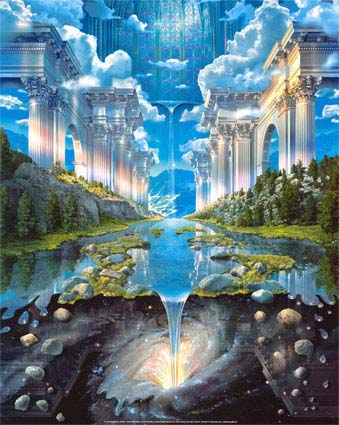 The following comes from one of my recent email conversations generated by my correspondent’s question, “What happens to our body and soul after we die?”
The following comes from one of my recent email conversations generated by my correspondent’s question, “What happens to our body and soul after we die?”
Me:
How deep do you want to go? Your questions lead into a quagmire of thousands of years of Western philosophy and religion … and I love you going there! Come, get stuck with me and all other mountain-top sitters who love to contemplate these things!
You can read plenty of my own theological opinions and research in my thesis (shameless plug), “Theology and Technology: Humanity in Process” (PDF), explanation page here. I am largely agnostic on an immaterial “soul,” a Platonic soul that is ontologically a separate substance from the physical body, specially created at conception, conjoined with the body. If I have to be nailed down I suggest scientifically-informed positions of dual-aspect monism or emergentism (leaning heavily toward the later). Mostly, what you see is what you get. When you die, on this side of the Resurrection, your current earthly body is dead, “you” are not “in the grave” or in the “ashes” or “out there” somewhere in limbo or in the clouds awaiting for Resurrection. You go directly to the general Resurrection. There are some Bible verses in the New Testament that imply “waiting,” but all of those theories imply reincarnation, a “soul” re-inhabiting a body, which is not resurrection. The Book of Revelation: NEW heaven and NEW earth, not re-enfleshed, re-incarnated soul. 1 Cor 15: resurrected self is soma pneumatikon (spiritual-body) verus soma psychikon (soulish-body), i.e. “soulish” implying earthiness, Hebrew nephesh, Greek psyche. See my thesis on this distinction.
Oh, one more clarification. I teach and preach in the midst of death, grief, and funerals that in the blink of an eye, from the perspective of the deceased, the person who has died goes directly to the Resurrection at the “Other End of Time.” It’s about Time as the fourth dimension of the Universe. The Big Bang is actually just a finite “point” on the “sphere” of Time-Space, and at the “Other Side” of the “sphere” of Time-Space is the culmination of reality, i.e. Alpha and Omega, straight from Jesus in Revelation. 🙂
Thus, for us on this side of life/death our dearly departed’s body is dead. From the “dead’s” perspective, they are not “dead,” they are aliver than alive!
Correspondent:
So, my loved ones who have died and have been buried or cremated are still on Earth waiting to be resurrected?
Me:
Yes. My position reflects the hard-core reality that on our present-earthly-life “side” of the Resurrection death is real and is to be mourned. The person is dead. At the same “time” (uh-oh, actually two different “times”), the “dead” person is instantly translated to the Resurrection and from their perspective “there is no more death or mourning or crying or pain, for the old order of things has passed away” (Rev 21:4). It’s about the re-creation of the entire universe, which on this “side” of things begs us to re-consider a completely different perspective of the whole shebang.
Again, the theological opinion/position of a simple Christian believer. No, they are not “on Earth” as we know it or in some ethereal realm or alternate dimension. They are dead from our perspective. From their perspective they are in the Resurrection / “Omega” part of the Universe/Time-Space. Death is real and I personally find it troubling to teach that loved ones are living some kind of lesser-than-full-resurrection-life as angels-in-the-clouds, an immaterial existence, twiddling their ethereal thumbs waiting for the real deal for thousands, millions, or even billions of years. No, we are instantly “with the Lord,” as Paul implies in Philippians 1:20-24. “To die is to gain” and “to be with Christ.” Doesn’t sound like immaterial angels-in-the-clouds existence to me. Christ arose “physically” from the grave, more precisely “soma-pneumatikonly” from the grave. We share in the same resurrection with the Christ.
Correspondent:
That takes away the comfort I feel/felt at funerals that they were somehow in a “better place.”
Me:
Oh, boy, I hope it doesn’t take away the comfort! I’ve prayed this and preached this theology many times in my few years of experience as a pastor in the midst of death and grieving, sometimes literally as the people were dying or have just died. Many people have expressed heart-felt thanks for receiving this view of death and the after-life, and they find it deeply comforting. Personally, this is the absolute core of the Gospel and the one thing I believe most strongly in my theology and spirituality. I only say that I am “agnostic” on the issue of body/soul because it’s a terribly complex issue and the evidence is elusive. What do we know empirically about what happens after death? Not much, if anything, by definition. I am not not agnostic on the Gospel message of Resurrection! That’s what it’s all about, IMO.
Correspondent:
Does Methodism have a one-two sentence answer to this question?
Me:
UMC’s official position? None that I know of. Sprinklings here and there, but when you look at the Service of Death and Resurrection in the Book of Worship you see what I’m preaching here all over that service. After all, we call it the service of “Death” AND “Resurrection” for Heaven’s/Alpha-Omega’s sake!



I find your belief system interesting, even believable. Just wish that it wasn’t wrapped in so much biblical jargon.
“biblical jargon” = “occupational hazard?” 😉